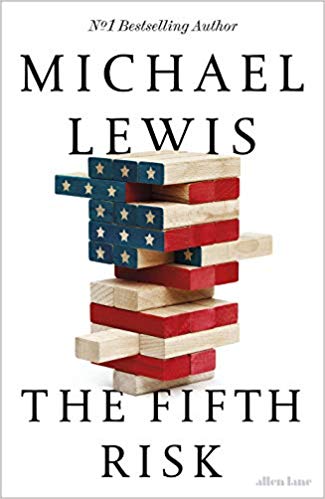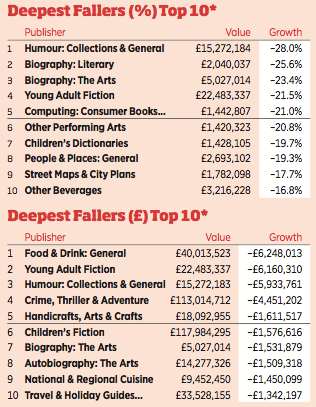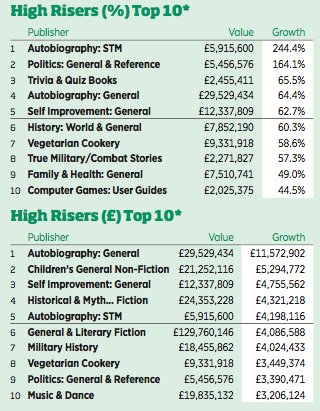You are viewing your 1 free article this month. Login to read more articles.
Review of 2018: Children’s continues growth as non-fiction drives the market across the board
Perhaps as a direct result of the Brexit omnishambles and worrisome politics across the Atlantic, the hot trends last year were books that focused on keeping body, mind and soul together; that celebrated inspirational or previously unsung life stories (as long as they weren’t celebrities), and ones that looked to experts to help examine and explain some of the weighty issues of the day.
Given that, it is unsurprising that Adult Non-Fiction: Trade was the major Nielsen BookScan category that drove last year’s relatively modest (+2.1%) overall growth. The £719.3m earned last year in NF:T was an eight-year high.
Children’s had a blink-and-you’ll-miss-it 0.07% rise in value but this—drumroll, please—represents the fifth year on the trot that the kids’ sector has had a record year through BookScan. At £384.9m, the children’s print market is nearly twice the size it was at the start of this century (£198m through BookScan in 2001, the first full year of genre data). In pure sales terms, we are living in the golden age of children’s books. Long may it last.
If Adult Fiction were to do an Instagram #10YearChallenge, the results would not be pretty: 2009 was its second-best BookScan return ever (£475.1m) and the sector has lost a quarter of its value in the meantime (–£116m), most of it, of course, migrating to digital. "Darling", Fiction’s followers might tsk, tsk "my, have you aged". But while Fiction may never return to its mid-to-late-Noughties heyday, the print resurgence is real, and seemingly lasting: its 1.8% bump was its the fourth consecutive year of growth.
Subcategory Fiction: General & Literary had its first TCM rise since 2015, a market-beating 3.3% hop to £129.8m. Gail Honeyman’s Eleanor Oliphant is Completely Fine (HarperCollins) earned £4.9m: the last book in the category to better that total in a calendar year was Dan Brown’s The Lost Symbol (Bantam), way back in 2009.

Hail to the chief
Adult Non-Fiction: Specialist is broadly the academic and professional category, which has, of course, suffered in print while surging digitally. Its five lowest TCM takings have all been recorded in the past six years. Yet the overall Politics & Government category had its biggest year since records began (up by almost a third on its previous record high, to £20.4m) and the orange-hued Twitter troll in the White House had much to do with it. Titles directly related to Donald Trump—led by Michael Wolff’s Fire and Fury (Little, Brown)—earned just under £6m of that sum.
But there were also a slew of titles tackling issues thrown up by the 45th president’s election—particularly around the rise of nationalism, racism and fascism—that scored, such as Michael Lewis’ The Fifth Risk (Allen Lane), Tim Marshall’s Divided (Elliot & Thompson) and Isabel Hardman’s Why We Get the Wrong Politicians (Atlantic).
As we see in our High Risers charts below, memoirs did well. Or rather, a certain kind of memoir: broadly, non-celebrity life stories that lifted the lid on particular professions—Adam Kay’s This is Going to Hurt and The Secret Barrister (both Picador)—or autobiographies that help others navigate through life, such as Dolly Alderton’s Everything I Know About Love (Fig Tree) and Matt Haig’s Notes on a Nervous Planet (Canongate).
Some celeb memoirs did work, but those tended to be cultish figures (Peter Crouch), or ones that offered something more than a run-down of career highs and lows: Michael Caine’s Blowing the Bloody Doors Off, for example, was presented as a guide to life. Michelle Obama is a celebrity, but her runaway success was clearly due to how inspiring she is to women in particular and—here we go, circling back to Trump—a little bit of nostalgia, as it reminded us that there can actually be decent human beings living at 1600 Pennsylvania Avenue in DC.
Largely because of the paucity of publishing in the celeb memoir space, but also because the titles that were released did not really sing (only Tina Turner’s My Love Story shifted over £1m through the TCM), BookScan’s Autobiography: The Arts slumped to its all-time TCM low (£14.3m). But never fear, we will still name our eighth annual Nancy Dell’Olio Award for Worst Selling Celebrity Memoir which goes to Hollywood wildman Nick Nolte’s Rebel (William Collins), which shifted 323 copies.


Growing pains
It was the best-ever year for Children’s overall, but some of its major categories had a difficult time. Children’s Fiction was led by top-selling author of the year David Walliams, but it dropped 1.3% in value (to £118m) and has fallen 6.4% since 2016—which, to be fair, was its TCM record year. Young Adult plunged 21.5% to £22.5m, slumping to an 11-year low. Not one YA title earned more than £500,000 through BookScan in 2018, the first time this has happened in 13 years.
Books for younger readers did well, with Picture Books (+0.6% to £60.1m) and Novelty & Activity Books (+1% to £55.9m) having slim growth, while Pre-school & Early Learning roared 18.7% to £15.1m. Or should we say brayed? Just under £1.1m was generated by Craig Smith and Katz Cowley’s viral video-boosted hit The Wonky Donkey (Scholastic).
Children’s General Non-Fiction was the big gainer, zooming up 33% and cracking the £20m mark for the first time since records began. It has been a pretty good run: this is the 10th year on the trot the category has recorded growth.
The driver has been ...Rebel Girls-esque books (though Francesca Cavallo and Elena Favilli’s own series is coded for adult categories) and the titles that deal with children’s self-esteem and mental health, such as Matthew Syed and Toby Triumph’s You Are Awesome (Wren & Rook) and Dawn Huebner’s What to Do When You Worry too Much (Magination).
Not a lot of laughs as Humour falls
 It wasn’t necessarily a collective decline in the national funnybone which resulted in Humour: Collections & General having the biggest percentage drop of any BookScan category (with sales of £1m+) in 2018, and the genre’s second-lowest return since records began. No, it is just a sign that the Ladybird and Famous Five parody-fuelled nostalgia boom of 2016 and 2017 is well and truly over.
It wasn’t necessarily a collective decline in the national funnybone which resulted in Humour: Collections & General having the biggest percentage drop of any BookScan category (with sales of £1m+) in 2018, and the genre’s second-lowest return since records began. No, it is just a sign that the Ladybird and Famous Five parody-fuelled nostalgia boom of 2016 and 2017 is well and truly over.
Food & Drink: General’s £6.2m plunge is due to the cookery market shifting to healthy eating categories, and the differential between Jamie Oliver’s 2017 and 2018: his TCM takings dipped £5.3m year on year. Healthy eating did not quite fill the void, however: overall sales in Food & Drink were £83.1m, a drop of 4.7%.
Physical sales of Crime, Thriller & Adventure have, of course, been heavily hit by digital over the past decade. But last year’s £4.5m drop is a slip in what had been a mini-renaissance. After four straight sub-£100m BookScan years—from 2012 to 2015, including the all-time low of £91.2m in 2014—sales had been rebounding: three straight years of growth, and exceeding that £100m mark in 2016 and 2017. The big hits earned less last year—in 2017, 28 books in the genre sold £500,000 or more through
the TCM (for £27.7m); in 2018, 29 books did, for £25.6m.
Readers look to relax as politics soars
 One or two titles can dominate smaller BookScan categories, yet rarely have two books cornered the market on one more than Autobiography: Science, Technical & Medical last year: a whopping 96.8% of its £5.9m was earned by Adam Kay’s This is Going to Hurt and Noel "the Supervet" Fitzgerald’s Listening to the Animals.
One or two titles can dominate smaller BookScan categories, yet rarely have two books cornered the market on one more than Autobiography: Science, Technical & Medical last year: a whopping 96.8% of its £5.9m was earned by Adam Kay’s This is Going to Hurt and Noel "the Supervet" Fitzgerald’s Listening to the Animals.
Michael Wolff’s Fire & Fury contributed just over half of Politics: General & Reference’s total, with another Trump exposé, Bob Woodward’s Fear, scoring a 16% share. Strip out the two US journalists’ titles from 2018 and Politics: G&R’s value sales would have declined by 16%.
In bigger categories, the hits make a smaller impact. Michelle Obama’s Becoming earned £7.8m but it “only” accounted for 26% of Autobiography: General’s takings. Children’s General Non-Fiction‘s £5.3m is a result of surging sales by a range of titles, led by Ben Brooks and Quinton Winter’s Stories for Boys Who Dare to be Different (£981,000).
Family & Health: General covers subjects as diverse as menopause guides and the US’ opioid crisis. It is interesting, however, that its two biggest books (and 28% of sales) deal with sleep and relaxation: Matthew Walker’s Why We Sleep (£1.3m) and The Four Pillar Plan (£846,000) by Dr Rangan Chatterjee.










